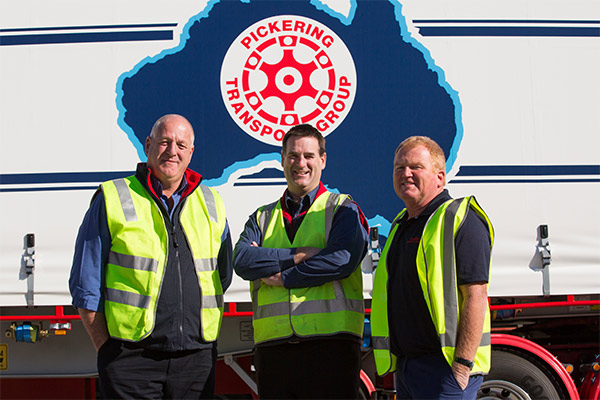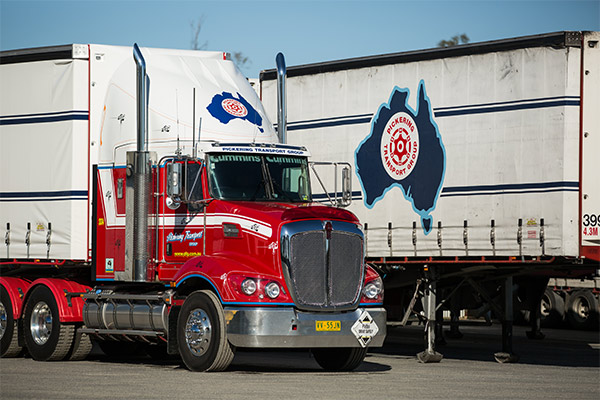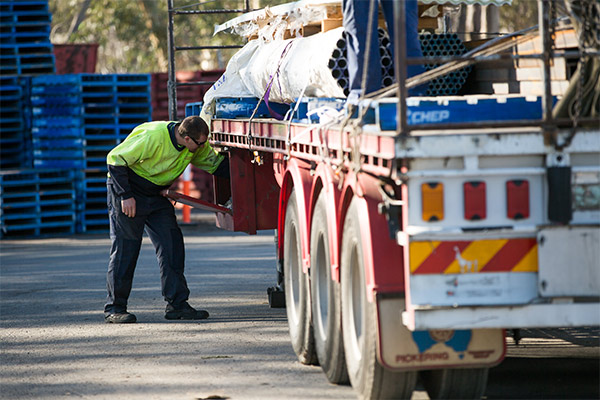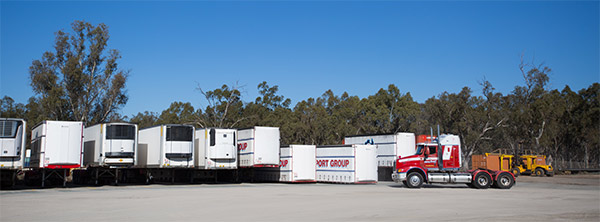Pickering Transport is based in the heart of Australia’s food bowl, transporting fresh produce from the wide Murray River region to all other points around the country. Paul Howell speaks to the company’s second generation of leadership in Swan Hill
The Murray River first forms in the Snowy Mountains, then heads west for a few thousand kilometres before finally turning south to its mouth, close to Adelaide.
Throughout that considerable length, it is a centre point for farming and agriculture in three states.
The Murray and its tributaries represent the world’s third-largest water-catchment area, and that has provided the principal irrigation source for a region many refer to as the food bowl of Australia.
Grains, fruits, vegetables, grapes, nuts and cotton are all grown successfully across the region, with that produce typically heading to markets and retailers in the cities and internationally.
That creates a huge but seasonal freight task that a large number of transport operators handle. Pickering Transport has been one of the most relied-upon for more than 60 years.
Director Daryl Pickering says the company is based in Swan Hill, but has branches following the river in both directions.
“We have depots up and down the Murray because that’s where our customers are,” he says. “It also lets staff be based closer to their homes around the region.”
Pickering Transport operates from properties in Kerang and Mildura in Victoria; Euston in New South Wales; and Renmark in South Australia. The company also has depots in Adelaide, Melbourne, Bendigo, Sydney and Brisbane.
Teenage brothers
The company’s size today a far cry from its humble beginnings. As teenagers in 1950, Ted Pickering, Daryl’s father, launched a single-vehicle service with his brother George. They bought a 1942 ex-Army Dodge along and ran single loads to Melbourne.
In 1954, they teamed up with a 15-strong group of owner-drivers from the area, forming a single collective business, Lake Boga Transport, and investing in a new truck.
Each partner brought their own vehicle and contracts in with the aim of sharing costs and extending the customer base across the region.
They also built a depot on a hairpin bend in the Murray River on the NSW side of Swan Hill, the route was an interstate journey – just – allowing the new company to circumvent higher road taxes imposed on local transport at the time.
The business grew as hoped for over the years, but the owner-driver contingent shrank. A range of circumstances led them to sell up their shares, and the Pickering brothers were always happy to buy them out.
“Slowly, as each one pulled up, George and I took up the slack,” the late Ted Pickering said of their increasing influence in the business. “[We] eventually ended up with the whole show.”
 |
|
Roger (left), Daryl and Jamie Pickering represent the second generation of leadership at Pickering Transport.
|
A similar process played out when Lake Boga Transport merged with the Mildura-based Kelly’s & Young Trucking. The two companies kept their own names, even when the Pickerings acquired full ownership of Kelly’s & Young close to the turn of the century.
Not until the new generation of management — the trio of Ted’s sons Roger and Daryl, and George’s son Jamie — did the merger extend to the two brands, and the newly named Pickering Transport emerged.
Second generation Today, Roger, Daryl and Jamie are working hard to build on their fathers’ legacy. The business has more than doubled since they formally took over its management in 2004, focusing on organic growth while maintaining several long-standing customer relationships.
“We are a really strong partnership,” Roger says, noting that each of the three has a different specialisation in management.
He handles operations and resourcing; Jamie leads the SA asset maintenance function across the company; and Daryl takes charge of administrative and compliance.
They each also work from different offices: Jamie at Renmark; Roger at Mildura; and Daryl at the Swan Hill head office that still occupies the same land that Ted and George bought more than 60 years ago.
“It’s a great place to have our headquarters — and there’s still more room to expand into,” Darryl Pickering says.
The trio describe their combined management style as “relationship-based”. That’s not just about how they work with customers and staff, but also how they interact with a range of other service providers that help the business achieve its goals.
Daryl says being open to the advice of experts in their fields has helped to shape Pickering Transport in its new generation of management.
“We’ve been with the same bank [Westpac] for 30 years, probably more,” Daryl Pickering says. “It’s the same with our business insurance [Zurich], and even our accountant [Swan Hill-based GMG Accounting].”
In the past few years, the team has been meeting monthly with their local advisor to develop long-term plans, policies and structures for the business.
“Rick [from GMG] has us looking at every angle of the company to make sure we are using the best possible practices and managing every risk. We’re also building up a long-term succession plan for the next generation.”
Purpose-built fleet
The long-term relationships don’t always stretch to a single brand of prime mover in the Pickering Transport fleet. The 110 trucks on its books are a mix of Scania, Kenworth and other models, but Roger Pickering says each is bought on its own merits at the time.
The company does, however, have a strong loyalty to Cummins engines, the presence of one on a candidate prime mover adding plenty of persuasion when those decisions are made.
“We’ve been using Cummins’ [engines] for as long as I can remember,” he says.
In addition to the prime mover fleet, Pickering Transport has a 300-strong array of different trailers available to it, including a large number of custom-built options.
These include different-sized refrigerated trailers for fresh produce, flat-tops, vans and also liquid carriers for bulk wine and milk haulage.
Each can be used on its own, or configured for B-double combinations, and even high-capacity road trains for routes heading north.
“We’re still a country transport business, primarily, so we have to be ready to cart anything and everything.”
A seasonal task
Fresh produce from the Sunraysia and Riverina regions makes up the vast majority of Pickering Transport’s work.
That makes for some highly seasonal surges and lulls in the company’s total freight task. Most fruits and vegetables, which Pickering is contracted to deliver to Woolworths supermarket DCs (distribution centres) in Victoria, are harvested between August and February.
The fast-growing almond industry [seriously, Australia now produces more than 70,000 tonnes each year] harvests in February and March. And the Coca-Cola products that Pickering Transport delivers in regional Victoria are also at their sweetest in the warmer weather.
The faster they move from the shelves, the more replacement deliveries are required.
Roger Pickering says that means all hands — and more —on deck during the summer months, with almost the entire 340-strong permanent workforce reporting for duty.
As well, the company brings in up to 50 additional subcontractors through its busiest times.
By contrast, the business utilises the annual downtime as best it can: vehicle inspections, maintenance and upgrades are scheduled; permanent drivers take leave; and with fewer distractions, forward planning can take place.
“It’s always going to be a seasonal business; it’s not something you can change. We just have to plan and work around it,” he says.
Dedicated staff
Jamie Pickering says having a flexible, dedicated and loyal workforce helps to make the production schedule work smoothly.
“Our staff are key to the business,” he says, noting that the workforce is incredibly stable for the industry and the region.
“We have guys who have been with us for 20 years and more. There are even a couple of father-son combinations who have worked with Pickering since even earlier.”
He says that sort of longevity is a product of the family business culture that permeates Pickering Transport. “Our staff are family and friends. We try to make sure that’s how they see us and the company as well.”
In this way, the company provides a great deal of training and career planning for each member of its team, also a range of staff services, including a corporate employee-assistance program for confidential counselling as required.
Service first
Whether it is fresh almonds, cans of Coke, or — as Ted and George first started hauling in 1950 — pumpkins, Pickering Transport has a driver, truck and trailer for it.
Not only that, it has the backing of a team of customer-focused directors who are keen to grow the business through long-lasting relationships with customers of all sizes.
That service philosophy has helped it grow throughout its more than 60-year history, and Daryl, Roger and Jamie Pickering reckon the same strategy will stand it in good stead for the next generation as well.




